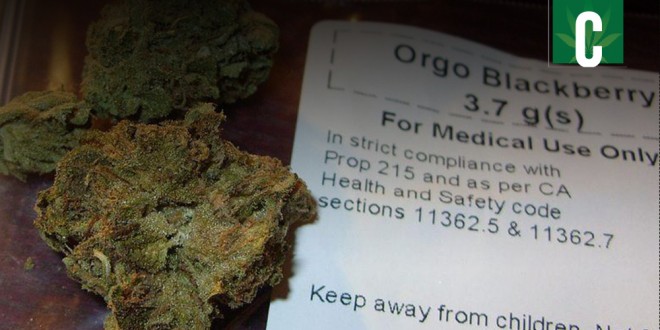Medical marijuana is big money in California. Now a group of lawmakers are pushing to put more of that cash in state coffers.
 Sen. Mike McGuire, a Democrat, sponsored legislation in February that would create a new 15 percent sales tax on medicinal cannabis sales.
Sen. Mike McGuire, a Democrat, sponsored legislation in February that would create a new 15 percent sales tax on medicinal cannabis sales.
Introduced Feb. 10, the bill would impose the first statewide tax on the drug. Medical marijuana was legalized by referendum 20 years ago, but that law made no provision for a tax.
McGuire’s proposal follows the introduction of new regulations passed by the state Legislature last year. They create a state licensing system and rules for the MMJ industry.
The regulations, signed into law by Gov. Jerry Brown, allow local governments to ban marijuana cultivation and dispensaries. That power would continue under McGuire’s legislation, which would allow municipalities to levy their own local taxes.
Tax income would enforce new regulations
McGuire told reporters his bill would stick to the letter of the new rules. The money raised by the tax would pay for enforcement of those regulations.
“We know these dollars will be put to strengthening our communities,” he said.
Medical cannabis generates more than $1 billion each year, McGuire said. With that kind of revenue, the state could take in $150 million in taxes, he said.
The money would be spent in two primary ways: Some would go to the state’s general fund, and some would pay for grants supporting local enforcement agencies. State parks, environmental projects, and addiction treatment programs would also get money.
McGuire’s bill would be similar to a public ballot initiative seeking to legalize cannabis for any adult use. That proposal would impose a 15 percent sales tax on recreational marijuana.
McGuire said the experience of Colorado drove him to introduce his legislation. In that state, medical marijuana is taxed at a much lower rate than recreational. As a result, more patients enrolled in MMJ for the tax break, he said.
That may not necessarily be a bad thing, but apparently lawmakers in California see it that way.
“The identical tax rate has worked best,” McGuire said.
Bipartisan support needed
The medical cannabis bill needs support from at least two thirds of the legislature, which means McGuire and other sponsors will have to win the backing of at least a few Republicans, who typically oppose any kind of tax increase. And Democrats may fight anything that seeks to tax a form of medicine.
That doesn’t make it impossible, though. Republican lawmakers have voted with Democrats on MMJ legislation in the past, including the new regulations enacted by Brown.
 But Melissa Melendez, a Republican member of the state Assembly, said lawmakers on both sides of the aisle may find it hard to vote for McGuire’s bill.
But Melissa Melendez, a Republican member of the state Assembly, said lawmakers on both sides of the aisle may find it hard to vote for McGuire’s bill.
“I anticipate that it will be a difficult choice for members of both parties,” Melendez said.
McGuire pointed to Washington, saying taxes on medical marijuana there and in Colorado have not made it harder for patients to get their medicine. And MMJ is technically “recommended” by doctors, not prescribed under federal law, he said, so the drug shouldn’t get the same tax-free status.
It’s not clear why that should matter to the state, since it is not responsible for enforcing federal law. Physicians issue recommendations rather than prescriptions to avoid federal prosecution, not to appease politicians.
If states start enforcing this narrow view of medical marijuana, marijuana patients could find themselves in an expensive spot. Even McGuire acknowledged the unfairness, but insisted he would go ahead anyway.
“I’m not saying it’s right, but there has to be a clear distinction,” he said.
 California Marijuana Market Breaking "Marijuana News" from CA
California Marijuana Market Breaking "Marijuana News" from CA





